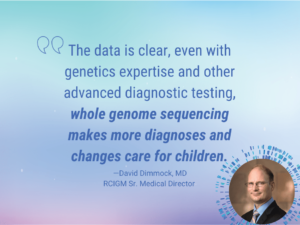Study population mirrors diversity of US demographics and findings could reduce inequity of care in acutely ill newborns
Illumina, Inc. (NASDAQ: ILMN) scientists, together with investigators from five children’s hospital across the US, have co-authored a study published today in JAMA Pediatrics reporting findings from the NICUSeq Randomized Time-Delayed Trial. Results show that use of clinical whole-genome sequencing (cWGS) outperforms standard of care by two-fold both in terms of diagnostic efficacy and change of clinical management of acutely ill newborns suspected of having a genetic condition. The data support the widespread adoption and implementation of cWGS for newborns in crisis.
Children’s Hospital of Philadelphia, University of Nebraska Medical Center (including the Munroe-Meyer Institute) and in partnership with Children’s Hospital & Medical Center in Omaha, Children’s Hospital of Orange County in conjunction with Rady Children’s Institute for Genomic Medicine (San Diego), Washington University/St. Louis Children’s Hospital and Le Bonheur Children’s Hospital (Memphis, TN) took part in study which enrolled a racially and ethnically diverse, and geographically distributed, population of acutely ill infants.
The patient population of 354 infants was randomized to either receive cWGS within 15 days (Early arm) or 60 days (Delayed arm) of admission, with a total observation period of 90 days. In both arms of the study, access to cWGS doubled the proportion of patients receiving a precision diagnosis of their condition and a change of clinical management.
“The NICUSeq study has shown us the importance of large scale genetic testing in newborns, leading to early diagnosis of genetic conditions and helping to inform decision making for physicians and families,” said Chester Brown, MD, PhD, Genetics division chief, Le Bonheur Children’s Hospital and the University of Tennessee Health Science Center (UTHSC). “Having this type of genetic information provides immediate and sustainable benefits that have lifelong value, providing a genetic ‘report card’ that can be used to help direct medical care throughout life. We are proud that Le Bonheur Children’s Hospital and UTHSC were able to contribute to this important effort to improve medical care for babies of the greater Memphis community.”
Importantly, the study mirrored the real-world variability of infant care, and as such shows that whole-genome sequencing overcomes inequities in usual care, according to the study investigators. “This is an essential conclusion of the study because we can’t claim victory until every family with an infant or child with suspected genetic or rare disease, has swift, affordable access to WGS to increase their probability of receiving potentially life-saving care changes and a diagnosis.” said Ryan Taft PhD, Vice President of Scientific Research at Illumina.
“The clear and important link between establishing a diagnosis and improved care management lends much weight to the adoption of cWGS as a first-tier diagnostic test in critically-ill newborns,” said Ian Krantz MD, Professor of Pediatrics at the Children’s Hospital of Philadelphia.

